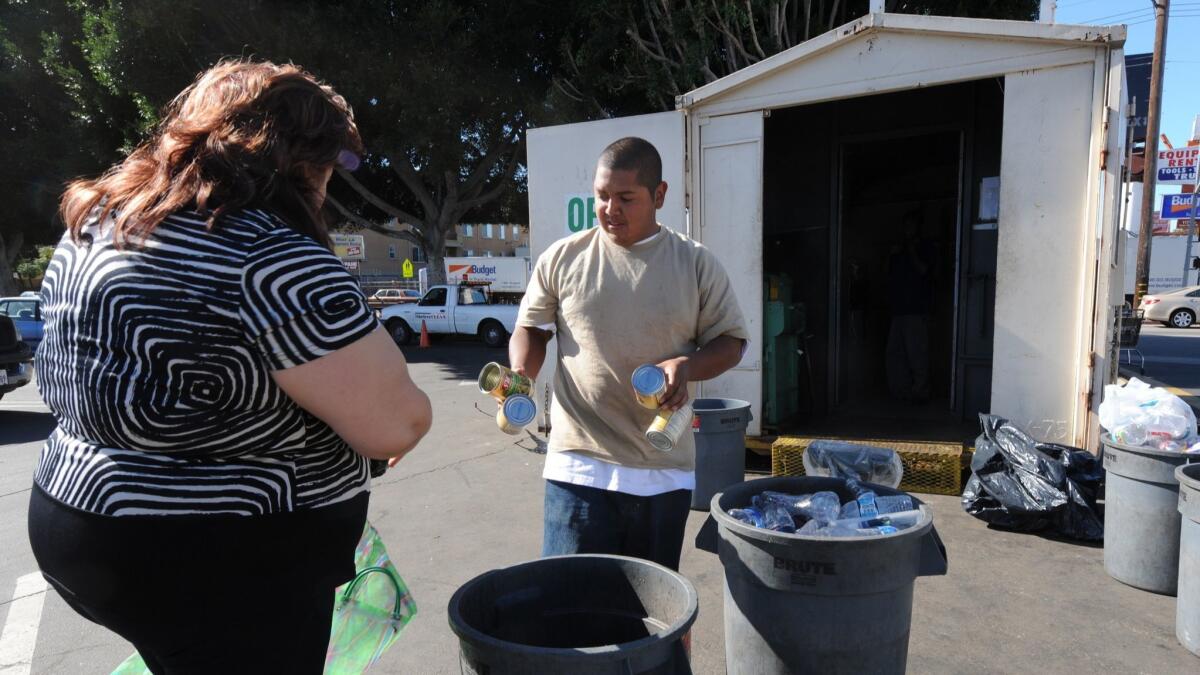Santa Monica’s recycling center closure is a sign of what’s to come

- Share via
Last month, Santa Monica’s only public recycling buyback center closed after the City Council declined to renew its contract with the company that operated it. For decades, the Delaware Avenue center was the go-to place for locals to turn their recyclables into cash. Now, they will have to find a redemption center in another city to recover the 5- or 10-cent deposits paid when bottles or cans are purchased.
On the surface, the council’s move may seem shocking for a city that has been at the forefront of trash-reduction efforts. But given the collapse in the market for recycled paper and plastic, it was an understandable decision. Just a couple of years ago, the city earned about $300,000 a year from the sale of paper, plastic, glass and other materials collected at the center and from curbside bins. Under the proposed new contract, the city would have to pay $1 million a year. The reliable cash cow had suddenly become a white elephant.
This is not a story about the end of recycling in Santa Monica, which will still have curbside collection for bottles, cans and paper. The council will contract temporarily with a company to process the recyclables it collects and may even figure out how to reopen the buyback center one day. But it is a cautionary tale — one among many playing out across the nation — about the end of easy and profitable recycling due to the meltdown of the global recyclables market.
It is a cautionary tale about the end of easy and profitable recycling due to the meltdown of the global recyclables market.
Last year China, the world’s largest buyer of recyclable material, stopped accepting most scrap plastic and paper. That was a particular problem for California, which had sold almost all of its paper and plastic recyclable material to buyers there. For a while, other counties such as Vietnam and Malaysia accepted some of the material China rejected, but they quickly became overrun and in some cases burned plastic material or dumped it in makeshift landfills.
This is not a problem just for Santa Monica. Local governments across the country are struggling to balance the rising costs of collecting recyclables — costs passed on to residents through trash collection fees — with the knowledge that much of the stuff they pay to divert from the trash will end up in the landfill anyway. Without demand, much of the material that cities are paying waste companies to process is virtually worthless and not likely to be made into something else.
Enter the Fray: First takes on the news of the minute »
There’s still a strong domestic market for the cans and bottles collected as part of California’s bottle bill, but not for paper and plastic. For example, mixed paper used to sell for $100 per ton; now it’s bringing in $10 a ton. Some cities, such as San Diego, are sucking up the costs to continue their programs in the hope that the market will get better. Others have stopped accepting material for which they can’t find a buyer. And at least one city, Deltona, Fla., decided to scrap its recycling program altogether rather than pay the higher costs. It probably won’t be the only one to do so.
There is a bright light here, though it’s hard to see through all the bales of plastic and paper trash piling up in warehouses. The recycling crisis has exposed this lie: that the ever-growing stream of single-use packaging is manageable if only consumers were more diligent in their recycling efforts. The public has noticed that plastic trash is ending up in the ocean anyway.
Thanks to this awareness, it will be tougher for lawmakers to avoid taking action to cut off trash at the source. Happily, that’s already happening. This year, New York, Maine and Vermont joined California in banning single-use plastic grocery bags. And California lawmakers are considering a radical new law that will fundamentally transform, for the better, how products are packaged in this state; the measure would bar manufacturers from selling products in California that are packaged in containers that can’t be recycled. The time for states to take such measures is now. As Santa Monica’s story shows, the costs of inaction are too high — for Californians and for the environment.
Follow the Opinion section on Twitter @latimesopinion and Facebook
More to Read
A cure for the common opinion
Get thought-provoking perspectives with our weekly newsletter.
You may occasionally receive promotional content from the Los Angeles Times.






